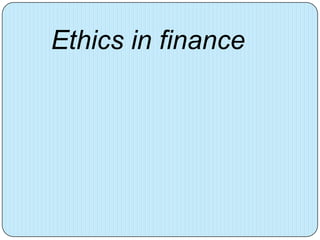Ethics in finance
- 2. Why is it important to worry about ethics in finance? •When you think about it, you realize that you put your hard-earned savings in the care of financial firms – asset managers, banks, insurance, and all kinds of funds – and you trust them to look after the money. •You want the best return, but there is a balance between risk and reward. •You need to feel confident that you can trust the finance professionals to act with integrity, in your interests.
- 3. Financial sector in INDIA REGULATORS RBI, SEBI, FMC, IRDA, PFRDA, MoF, HLCC MARKETS Commodities, equities, debt , foreign exchange PLAYERS Brokers, firms, banks, financial institutions, FII ,mutual fund managers, investors, exchanges, depositories, custodians, registrars
- 4. ETHICAL VIOLATIONS (finance related) 1. Insider trading • Insider trading is the trading of a corporation's stock or other securities (e.g. bonds or stock options) by individuals with potential access to non-public information about the company • Such a trade is motivated by the possibility of generating extraordinary gain with the help of nonpublic information (information not yet made public). It gives the trader an unfair advantage over other traders in the same security.
- 5. 2-Stakeholder interest V/s stockholder interest Shareholders hold shares in the company – that is they own part of it. Stakeholders have an interest in the company but do not own it (unless they are shareholders). Often the aims and objectives of the stakeholders are not the same as shareholders and they come into conflict. The conflict often arises because while shareholders want short-term profits, the other stakeholders’ desires tend to cost money and reduce profits. The owners often have to balance their own wishes against those of the other stakeholders or risk losing their ability to generate future profits (e.g. the workers may go on strike or the customers refuse to buy the company’s products).
- 7. Examples of unethical temptations Make exaggerated claims to counter exaggerated claims of a competitor Offer a customer an unauthorized ‘gift’ in return for their business Conceal information from a customer in order to get their business and to meet your sales’ goals Put non business-related expenses on your expense account Divulging confidential information about one customer to another in order to facilitate a sale
- 8. Common Reasons (Excuses) for Unethical Behavior 1. ‘Everybody’ else is doing it. 2. It’s not that big of a deal. 3. It’s necessary (the ends justify the means). 4. It’s not going to hurt anyone. 5. It’s for the benefit of the company or somebody else. 6. I deserve it. 7. It’s legal. 8. Nobody will know.
- 9. Common Product Categories. Planning products They are designed to preserve wealth or income and include life, disability and long-term-care insurance and annuities. Recommended products complement core offerings such as estate, business or financial planning. Service products These products are designed to protect clients against unanticipated losses. They include health, auto and homeowners' insurance, for example. Such product recommendations do not result from a firm's core offering. Investment products These are designed to accumulate wealth. This category is transactional-- based on market trades--and as such the most removed from a firm's core services.
- 10. How to curb unethics? 1. Improving standards 2. Comprehensive laws 3. Pledging of shares 4. Weak links 5. Auditors’ role 6. Institutional investors
- 11. Ethics In Financial Service Financial Services Professionals job and mission is to enable clients to grow and protect their wealth. This means trillions of dollars of assets are involved. The Financial Services industry is also highly regulated. Regulation minimizes fraud, theft and misuse. Ethics purifies the industry. Ethics set the standards of excellence for professionals in financial services. Ethics in the financial services industry affect everyone…even consumers. If you are not a Financial Services Professional, you’re a consumer of Financial Services.
- 12. Code Of Ethics •Protecting the financial interests of clients •Conducting business with high transparency •Conducting needs analysis before any product or service recommendations •Respecting and maintaining confidentiality of any information entrusted to you •Use of only sales illustrations that are completely accurate and compliant with state and Central Govt regulations •Knowing when to refer clients to another professional when a planning situation is outside your area of practice or skill sets.
- 13. THANK YOU
